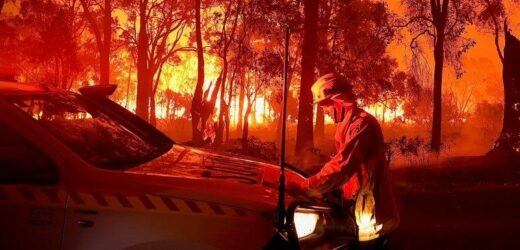The United Nations’ Intergovernmental Panel on Climate Change (IPCC) has just updated its assessment of the existing and future impacts of climate change.
Brace yourselves because what we’re about to tell you about how Australia is and will fare is going to be a tough read.
The IPCC report is predicting a drastic rise in severe fire weather conditions. A firefighter takes a moment amid raging bushfires in WA last month.Credit:AAP
The consequences for Australia include irreversible loss of coral reefs, loss of alpine species, collapse of forests in southern Australia, loss of kelp forests, a drastic rise in severe fire weather conditions, sea-level rise and a dramatic increase in fatal heatwaves.
Australia is one of the most vulnerable developed countries in the world. Right now, rainfall and flood records are being obliterated in south-east Queensland and Northern NSW. These communities have hardly had time to recover from past disasters and again they’re facing profound heartbreak and loss.
Every Australian remembers Black Summer, a bushfire disaster that the world’s media labelled the “canary in the coal mine” as they watched the horror of climate change playing out in real time.
For many, it was the moment when climate change switched from being a future hypothetical to “something that’s here, hurting us now”.
In 2020, Australians realised they were living with climate change and its effects.Credit:Getty Images
This is happening under the watch of national governments around the world, including our own Morrison government. A government whose inaction is contributing to catastrophic levels of global warming.
If we continue on our current trajectory, the extreme weather that drove the Black Summer fires will be average by 2040.
There’s simply no adapting to such conditions. Even with an enormous increase in fire service budgets and a fleet of water bombing aircraft, the fires in Australia will be too big, too hot, and too fierce for firefighters.
Our ecosystems simply don’t regenerate to what they were before following such catastrophic events.
If the Great Barrier Reef suffers a mass bleaching event every year, it won’t have time to recover. These tipping points mean irreversible changes to our iconic Australian land and seascapes.
In some ways, this latest IPCC report says much the same thing the world’s eminent climate scientists said in the last such report released in 2014. The difference is that the impacts of climate change are happening even faster now. We can’t wait to fix this. We need to act now.
As many Australians living through devastating floods right at this moment, understand too well: the emergency is here.
Yet Australia does not have a single effective policy to slow and halt the ravages of a rapidly changing climate.
Instead, we have politicians who seem hell-bent on accelerating disaster by championing the problem – fossil fuels like coal, oil and gas – via a “gas-fired COVID-19 recovery”, directly subsidising fossil fuels, greenlighting more polluting gas and coal projects and consistently ignoring the experts.
The government’s “Plan to Deliver Net Zero”, launched late last year, doesn’t cut it. It relies on technology that is yet to be invented and what’s more, the actual modelling contained in the plan fails to get Australia to their own target of net zero, by 2050.
Australians would actually be better off if the Morrison government did nothing at all. The choices our government has made over this past decade have not only set us back when it comes to acting on the climate challenge, but have actually accelerated us towards catastrophe. Now we’re at the precipice.
Our leaders have a responsibility to step up to the climate challenge, listen to the experts and act swiftly. It’s their job to act in our interests, and keep us safe. Not put us, our children or grandchildren in harm’s way.
We have a choice. We can become a nation that is strong and decisive on climate action, with emissions reduction policies that will not only be respected by our strategic partners and allies around the world but will also deliver many benefits to Australians at home.
The Climate Council recommends we reduce domestic emissions by 75 per cent on 2005 levels by 2030, and reach net zero by 2035.
The science is very clear on what we stand to gain versus what we stand to lose. The technology and solutions we need to achieve this are available and ready to be turbocharged. There can be no more excuses, no more rhetoric, no more buck-passing.
With strong and decisive action we can avoid many of the future horrors projected for Australia in this IPCC report.
As United Nations Secretary General Antonio Guterres said at the report launch: “Fossil fuels are choking humanity. Now is the time to turn rage into action, every fraction of a degree matters.”
Prof Lesley Hughes is a Climate Council Councillor, former IPCC report author, climate change scientist and Distinguished Professor of Biology at Macquarie University.
Greg Mullins is a Climate Councillor, former commissioner, Fire and Rescue NSW, founder of Emergency Leaders for Climate Action (ELCA), author of Firestorm, and serving volunteer firefighter
Most Viewed in Environment
From our partners
Source: Read Full Article




